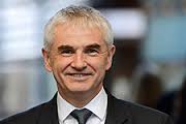Dutch Politician Defends Renewables Against Gas
Dutch green politician Bas Eickhout made clear that the European gas industry needed to accept that gas demand would fall, as the need to decarbonise would hit the power sector harder than the agricultural and transport sectors.
During a panel session at the Flame Conference in Amsterdam May 9, he said Europe's commitments to limit carbon dioxide (CO2) emissions would mean the power sector – which is now seeing a boom time thanks to nuclear outages in France and the carbon floor in the UK – could not expect much of a future post 2040. “We need to update the 2050 roadmaps,” he said, referring to forecasts of EU gas demand published by the European Commission. But he also said nobody in political circles was fighting gas.

Bas Eickhout MEP, leader of the Dutch GroenLinks party in the European Parliament (Photo credit: Eickhout/Twitter)
Statoil’s gas marketing and trading senior vice president Tor Martin Anfinnsen (pictured below) said that the expansion of the power grid to replace gas would have a huge cost that consumers would have to pay for. Eickhout however pointed out that the grid needs replacement anyway, and that there are alternatives to gas in the power sector; this was not the case for industry which needs gas as a catalyst or as feedstock, and uses much smaller volumes than the power sector.

Photo credit: Statoil
Eickhout said the power sector needs a carbon price of at least €40/metric ton to drive carbon capture and storage projects (CCS), while fertiliser and other sectors of industry need a low CO2 price, suggesting that gas producers need to invest in CCS technology. It is now around €5-6/mt. “The carbon price will never reach a price at which CCS makes sense,” he said: “The price of CCS needs to be a part of the gas price.”
Transport could also be in the frame for electrification, although the car lobby has been fighting hard against this, notably in Germany. However the ‘dieselgate’ scandal, in which Volkswagen and other manufacturers misled consumers over emissions, might hasten the change in that direction.
Politicians who promoted the use of diesel have realised they have been backing the wrong horse, said Eickhout, but this would be for passenger cars rather than bigger vehicles.
William Powell



